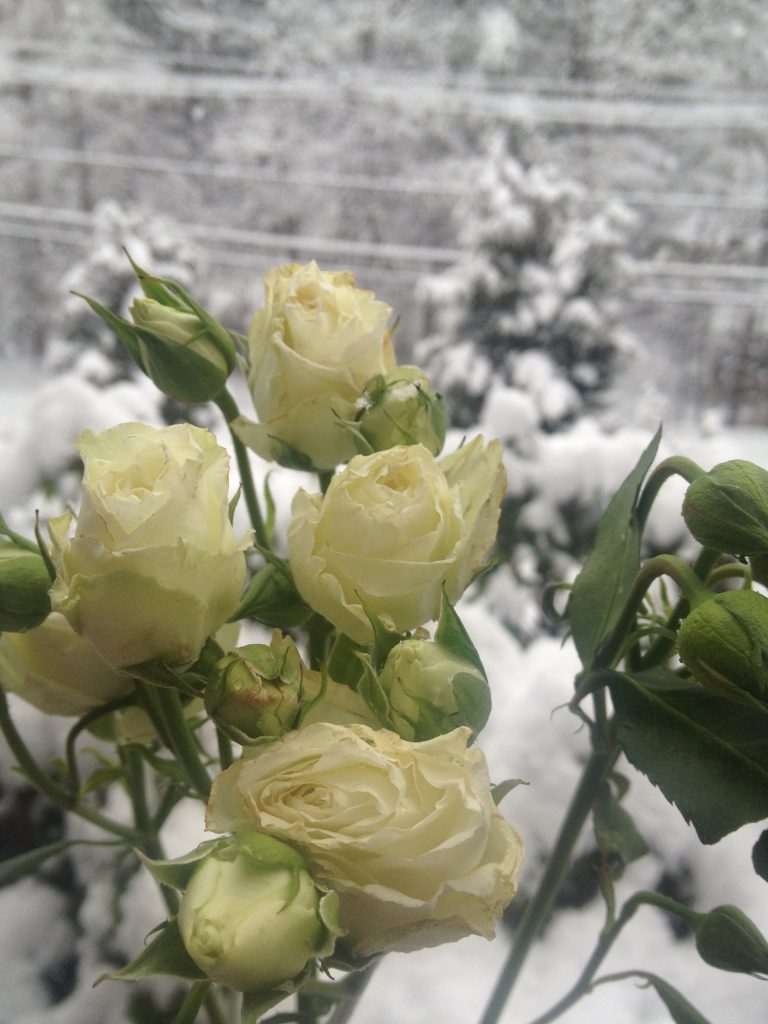Thought for contemplation :
“Winter is the time for comfort, for good food and warmth, for the touch of a friendly hand and for a talk beside the fire: it is the time for home.”
– Edith Sitwell
Theme: “Roses in Winter” The world can be a harsh and lonely place. Perhaps felt more so in New England’s cold winter months. Loving friendships are essential antidotes to bleak winter days and to warding off any foreboding sense of desolation we encounter in our hearts when we forget that we belong to one another.

Song
“Come Sing a Song with Me” by Carolyn McDade
Suggested Readings:
“Alone” by Maya Angelou
“You Will Always Mean Something to Someone” from Watering the Soul by Courtney Peppernell
“A Time to Talk” by Robert Frost
“A Friend” by Gillian Jones
“Red Brocade” by Naomi Shihab Nye
“Friendship” quotes by Kahlil Gibran

Message Excerpts :
Robert Frost’s poem “A Time to Talk,” paint for us a picture of a day interrupted.
Something we can easily relate to as we, too, have household tasks, yard work, and seemingly
a million little and large things,
that take much of our time and effort,
resources and focus.
Yet, he presents, an example of how to prioritize and make room for friendship
when the opportunity presents.

Kahlil Gibran, relayed this
When asked to Speak about Friendship:
“He answered, saying:
Your friend is your needs answered. He is your field which you sow with love and reap with thanksgiving.
And he is your board and your fireside. For you come to him with your hunger, and you seek him for peace.”
Further down in a lengthy characterization of Friendship, he continued by stating
“let there be no purpose in friendship save the deepening of the spirit.”
He knew and shared that friends, friendships and being a friend, are integral aspects of our human lives. We need them.
We need them for the love and comfort they can offer. We need them for the love and comfort we can give.

Andrew Gold’s iconic lyrics, turned theme-song for The Golden Girls television series,
“Thank You for Being a Friend” echos in many of our hearts and minds as the epitome
of what friendship is and can be:
“Thank you for being a friend; Traveled down a road and back again; Your heart is true,
you’re a pal and a confidant”
Its ensemble cast of Bea Arthur, Betty White, Rue McClanahan, and Estelle Getty – Portraying their respective characters: Dorothy Zbornak, Rose Nylund, Blanche Devereaux, and Sophia Petrillo – in hilarity, fun-filled antics,
sprinkled with drama and poignancy centered entirely on themes of friendship.
Friendships in harmony.
Friendships in disharmony.
Friendships over-coming trials.
Friendships meeting each other at milestones, thresholds and transitions in life.
Indeed, the theme of friendship may match, if not exceed, the theme of romantic love,
when it comes to what has been channeled through The Mystics and Poets and Songwriters throughout the ages and into our modern time.
Yes, friendships bring with them alot of benefits. So often, roles in friendships can be framed in what we get out of them. Companionship. Cheerleaders. Volunteers for our social endeavors. Mirrors to bounce our feelings off of. To ward off loneliness, and to affirm our existence in the places and positions we hold in the world.
Friendship is for laughter and for comfort.

Our Thought for Contemplation by Edith Sitwell is worth repeating, given the season:
“Winter is the time for comfort,
for good food and warmth,
for the touch of a friendly hand
and for a talk beside the fire: it is the time for home.”
There are many ways we can bring laughter and comfort to each other.
Especially in wintertime, circled around warm fires. Kindling friendships,
Doing activities together,
Singing songs,
Playing board games and cards, Telling stories,
Talking – and talking more.
Going snowshoeing and ice-skating. Having coffee and tea and meals together.
Even sitting in silence reading together.

I encourage following the Hygge (“hoo-guh”) example of the Danish culture.
Creating atmospheres of coziness and comfort
and relaxation when you gather as friends.
Such can instill a sense of welcome and openness that can naturally deepening friendships.
Making efforts, too,
to connect with those friends
whom we know are homebound,
or don’t travel much on winter roads.
Yes, there are many ways to cultivate friendship and share fellowship – even in winter.

At the heart of every healthy friendship,
is not as much about what we get out of a friendship, or even, really, what we give to a friendship, individually,
but, rather,
why we care to be part of the friendship at all.
And, how it builds mutually, beneficially,
builds each friend in the friendship up.

Courtney Peppernell words we heard earlier in her poem “Watering the Soul”:
“You will always mean something to someone”
is a wonderful way to consider friendships.
Good friendships instill in us a sense of Belonging.
Some Signs of a Good Friendship
A Friend Is There For You.
Consistently.
You can trust that they will stand with you,
be by your side,
recognize you for who you are.
A Friend Listens To You.
They are someone you feel comfortable talking with and sharing your authentic thoughts, feelings and beliefs.
And, you do likewise for them.
When you are in a Good Friendship
You Feel Good When You’re Around Them.
You generally enjoy each other’s company and look forward to spending time together.
Are Empathetic Towards Each Other.
Good friends are not judgmental, nor dismissive of each other.
Good Friends Are Able To Apologize And Forgive Each Other.
Even in the best of friendships,
disharmonies and disagreements can arise.
Good friends are able to apologize and forgive each other.
Good Friends Each contribute to Nurturing the Relationship. Good Friendships are not one-sided, but, rather Mutual.
And each friend in the friendship is
mindful about fostering respect, compassion, appreciation and love.

In this faith tradition, one of the most familiar and heart-warming songs portraying
the depth of what a friendship can be,
is Carolyn McDade’s,
“Come Sing a Song with Me.”
The sentiment well encapsulated in the very heart-full reasoning of why one wanted to spend time with one’s friend,
“that I might know your mind.”
While Carolyn wrote it in 1976, it lay dormant for a long time. Not being included in her singing groups’
song books for many years.
She said of this, that
“I don’t like sweet songs.”
And
“It’s so, so sweet,”
So I left it beside the side of the road to languish. I didn’t even leave it a pot of water.
‘There you go, out the window.’ (I said to it)
Years later, what did I see coming down the road toward me but this sweet little song?
Other people had found it, loved it, cared for it,
and it had a life.”
Carolyn speaks of her songs as her teachers.
And, the story behind the story of “Come, Sing a Song” had a sort of time-delayed teaching for her.
The chaplain of the women’s state prison in Framingham, Massachusetts in the 1980s, invited Carolyn
to offer a music program at the prison.
She accepted the invitation and
brought “Come, Sing a Song” with her as part of her program – mainly because it was easy to learn.
Yet, something magical happened.
When the prisoners sang it, they did so in a way she had never heard before.
The experience was so moving, she had to stop singing herself So she could just listen
to those women singing it.
She realized that her sweet song, to be especially meaningful, needed context.
It needed to be felt, embodied even.
‘I’ll give you hope, when hope is hard to find’
The prisoners, incarcerated,
desperately needing hope,
Yes, they, they had context to bring to it.
Carolyn said the song, well “It went from sweet to profound.”

When we bring context to why we need our friendships, When we acknowledge our inherent need for our friendships,
When we affirm with appreciation
the value of being able to share our
Songs and dreams and fears and hopes within the haven of our friendships,
Our friendships transform to even deeper levels. Founded in the kind of trust that is built with love.

As Bell Hooks tells us,
“The word ‘love’ is most often defined as a noun,
yet we would all love better if we used it as a verb.”
I think we all know that.
And for our friendships to flourish, we each need to be active,
loving participants in our friendships.

Within Lesson 67 of A Course in Miracles, it states that
“Everything is either love or a call for love.” This is certainly true of our friendships.
It could be said as well, that the interactions within friendships is
“Hope, or a call for Hope”
For hope and love are intertwined.
How we bring hope and bring love to our friendships is unique, and in direct response
to that which is called for.

Of “love” Mother Teresa says,
“Do not think that love in order to be genuine has to be extraordinary.
What we need is to love without getting tired. Be faithful in small things
because it is in them that your strength lies.”
Yes, we must give energy to our friendships, Yet not to the point that we are depleted.
Friendships work, and can be sustainable, when the energy of giving,
and of receiving,
Flows both ways.
Honoring our friendships by providing them with the needed time to flourish, with compassion that opens paths to understanding and being understood by each other.

We need our friendships!
We need our friendships in times of celebration. To share our joys.
And for everyday conversations.
The world can be a beautiful and magical place; Experienced even more so
within the embrace of friendship.
We need our friendships when life is hard And challenges are present.
The world can be a harsh and lonely place.
Perhaps felt more so in New England’s cold winter months.
Loving friendships are essential antidotes to bleak winter days, and to warding off any foreboding sense of desolation
we encounter in our hearts
when we forget that we belong to one another.
We belong to one another.
In friendship and in love.
Being Roses in Winter, as needed.
g with me, Come, dream a dream with me, Come, share a rose with me, that I might know your mind.
And I’ll bring you hope when hope is hard to find, and I’ll bring a song of love and a rose in the wintertime.
May it be so.